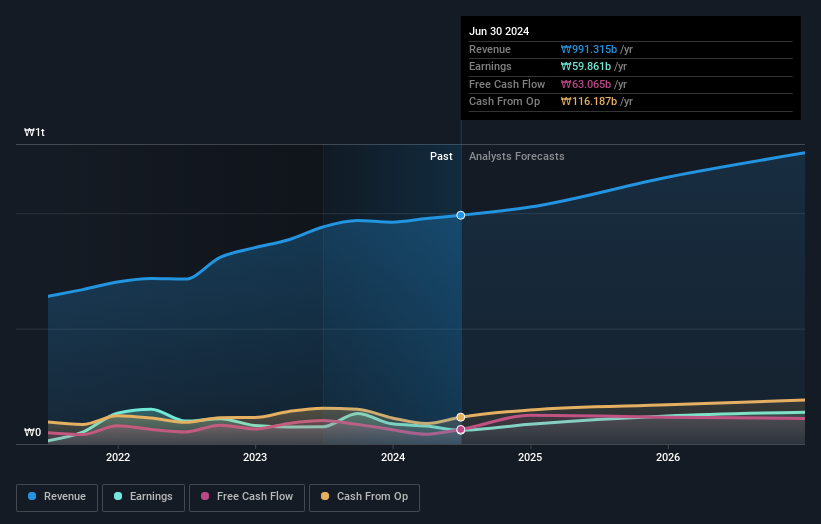- South Korea
- /
- Entertainment
- /
- KOSDAQ:A041510
SM Entertainment Co., Ltd.'s (KOSDAQ:041510) market cap surged ₩77b last week, public companies who have a lot riding on the company were rewarded

Key Insights
- The considerable ownership by public companies in SM Entertainment indicates that they collectively have a greater say in management and business strategy
- The top 2 shareholders own 52% of the company
- Institutions own 19% of SM Entertainment
A look at the shareholders of SM Entertainment Co., Ltd. (KOSDAQ:041510) can tell us which group is most powerful. And the group that holds the biggest piece of the pie are public companies with 52% ownership. Put another way, the group faces the maximum upside potential (or downside risk).
As a result, public companies collectively scored the highest last week as the company hit ₩1.4t market cap following a 5.9% gain in the stock.
In the chart below, we zoom in on the different ownership groups of SM Entertainment.
Check out our latest analysis for SM Entertainment

What Does The Institutional Ownership Tell Us About SM Entertainment?
Many institutions measure their performance against an index that approximates the local market. So they usually pay more attention to companies that are included in major indices.
We can see that SM Entertainment does have institutional investors; and they hold a good portion of the company's stock. This suggests some credibility amongst professional investors. But we can't rely on that fact alone since institutions make bad investments sometimes, just like everyone does. When multiple institutions own a stock, there's always a risk that they are in a 'crowded trade'. When such a trade goes wrong, multiple parties may compete to sell stock fast. This risk is higher in a company without a history of growth. You can see SM Entertainment's historic earnings and revenue below, but keep in mind there's always more to the story.

Hedge funds don't have many shares in SM Entertainment. Looking at our data, we can see that the largest shareholder is Kakao Corp. with 42% of shares outstanding. In comparison, the second and third largest shareholders hold about 9.8% and 4.5% of the stock.
To make our study more interesting, we found that the top 2 shareholders have a majority ownership in the company, meaning that they are powerful enough to influence the decisions of the company.
While studying institutional ownership for a company can add value to your research, it is also a good practice to research analyst recommendations to get a deeper understand of a stock's expected performance. There are a reasonable number of analysts covering the stock, so it might be useful to find out their aggregate view on the future.
Insider Ownership Of SM Entertainment
The definition of an insider can differ slightly between different countries, but members of the board of directors always count. Company management run the business, but the CEO will answer to the board, even if he or she is a member of it.
Most consider insider ownership a positive because it can indicate the board is well aligned with other shareholders. However, on some occasions too much power is concentrated within this group.
We can see that insiders own shares in SM Entertainment Co., Ltd.. The insiders have a meaningful stake worth ₩61b. Most would see this as a real positive. It is good to see this level of investment by insiders. You can check here to see if those insiders have been buying recently.
General Public Ownership
The general public-- including retail investors -- own 25% stake in the company, and hence can't easily be ignored. While this group can't necessarily call the shots, it can certainly have a real influence on how the company is run.
Public Company Ownership
It appears to us that public companies own 52% of SM Entertainment. This may be a strategic interest and the two companies may have related business interests. It could be that they have de-merged. This holding is probably worth investigating further.
Next Steps:
It's always worth thinking about the different groups who own shares in a company. But to understand SM Entertainment better, we need to consider many other factors. Consider for instance, the ever-present spectre of investment risk. We've identified 2 warning signs with SM Entertainment , and understanding them should be part of your investment process.
If you would prefer discover what analysts are predicting in terms of future growth, do not miss this free report on analyst forecasts.
NB: Figures in this article are calculated using data from the last twelve months, which refer to the 12-month period ending on the last date of the month the financial statement is dated. This may not be consistent with full year annual report figures.
New: Manage All Your Stock Portfolios in One Place
We've created the ultimate portfolio companion for stock investors, and it's free.
• Connect an unlimited number of Portfolios and see your total in one currency
• Be alerted to new Warning Signs or Risks via email or mobile
• Track the Fair Value of your stocks
Have feedback on this article? Concerned about the content? Get in touch with us directly. Alternatively, email editorial-team (at) simplywallst.com.
This article by Simply Wall St is general in nature. We provide commentary based on historical data and analyst forecasts only using an unbiased methodology and our articles are not intended to be financial advice. It does not constitute a recommendation to buy or sell any stock, and does not take account of your objectives, or your financial situation. We aim to bring you long-term focused analysis driven by fundamental data. Note that our analysis may not factor in the latest price-sensitive company announcements or qualitative material. Simply Wall St has no position in any stocks mentioned.
About KOSDAQ:A041510
SM Entertainment
Engages in music/sound production, talent management, and music/audio content publication activities in South Korea and internationally.
Flawless balance sheet and good value.


